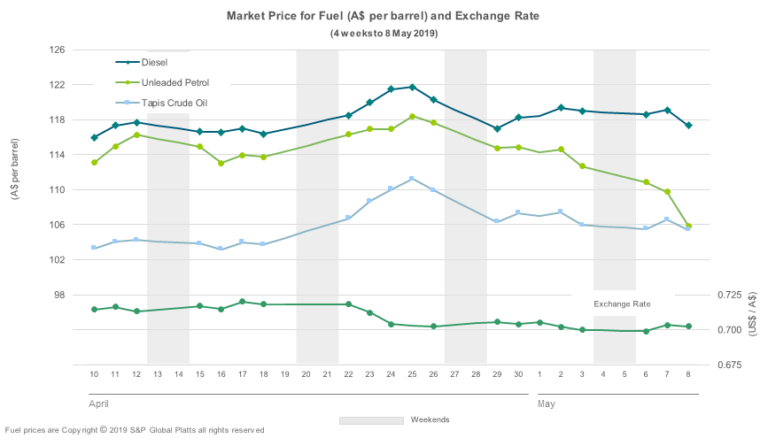Petrol prices have spiked in capital cities, with unleaded prices soaring as high as 167.9 cents in Brisbane.
Meanwhile, prices in Adelaide hit 165 cents this week, in Melbourne the average price was 158.3 cents, while Sydney – which is in the cheaper part of its price cycle – had an average price of 139.2 cents for unleaded on Thursday.
Motorists in Perth and Hobart were paying more than 150 cents a litre, while Darwin – which in the past four months has become the nation’s cheapest capital city for petrol – was at 144.9 cents a litre for unleaded.
Brisbane’s pump price was up by almost 30 cents on the average price for a litre of unleaded on Wednesday.
The price shock comes at the same time as the cost for unleaded fuel has slipped from $118 a barrel around April 24, to $106 a barrel on Thursday – a 10 per cent drop within a fortnight.
The hike, says fuel industry commentator Geoff Trotter, can be best explained by a graph from the Australian Institute of Petroleum that shows the narrowing gap between the price of unleaded fuel (light green) and crude oil (blue).
“The gap between the two is referred to as the ‘refinery margin’,” explained Mr Trotter, general manager of FUELtrac.
“With crude prices now around the same as the wholesale unleaded price [about $106], oil companies aren’t making that [refining] margin, and so they’re having to play catch-up.
“Whatever an oil company loses in refinery margin, they are trying to recoup in retail margin.”
And one retailer in particular, he alleges, is playing that game of catch-up harder than most – Coles Express.
“We [FUELtrac] track price movements and almost inevitably, the price leader in every city are Coles Express stations,” Mr Trotter said.
“It all starts at Coles Express stations. And the reason Coles Express stations are leading the prices, is they are making up for the loss in their refining margin.”
Mr Trotter cites several examples of Coles stations raising prices that then ripple out through neighbouring stations.
The animation below provides a snapshot (from price-monitoring site Motormouth.com.au) of fuel price movements in the north-eastern Brisbane suburb of Deagon on Thursday.
The first station to move was Coles Express Deagon to 167.0 cents, which quickly filtered out to neighbouring stations – even the usually cheaper independent 7-Eleven outlets – to 167.9 cents, with one, the independent Pacific Petroleum, raising its unleaded price to 165.9 cents.
Mr Trotter said while price-tracking apps, such as Motormouth, were designed to help consumers find the cheapest price, they were also helping competitors quickly detect and match price movements, as in the example above.
Certainly, the Australian Competition and Consumer Commission has repeatedly confirmed Coles Express as the highest-priced fuel seller in the country.
Coles Express isn’t Coles
Coles Express stations are supplied by, and their prices set by a company called Viva Energy.
The Australian arm of a Anglo-Dutch energy company, Vitol, Viva bought Shell’s operations in Australia in 2014 and took control of fuel pricing from Coles Express earlier this year.
Along with its half interest in Liberty outlets*, it has a network of 1255 stations, making it the largest single fuel retailer in the country.
Mr Trotter says Viva controls about a quarter of the market, while its own website also claims “we supply around a quarter of the country’s total liquid fuel requirements”.
Soon after the Coles deal, Viva chief executive Scott Wyatt told Fairfax Media he was determined to “bring more competition to the market”.
In a statement, Viva Energy told The New Daily: “Retail fuel prices in Australia are reflective of market forces that have recently included a sharp increase in oil prices.”
When challenged with the fact that the (Singapore) unleaded fuel price had come down 10 per cent in the past fortnight, a company spokesperson referred The New Daily to the Australian Institute of Petroleum (AIP).
A spokesperson for BP also directed our inquiry to the AIP.
The New Daily left a message with the AIP but did not receive a response before deadline.
Extracted from The New Daily
